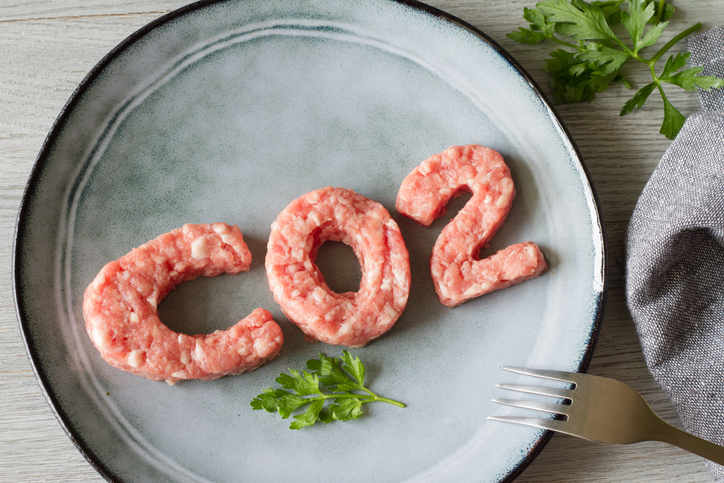
Per capita, Europeans produce around 3 tons of CO2 emissions per year through the production, transport, and packaging of food. That’s about a third of our total carbon footprint. The own value depends strongly on the individual eating habits and can differ from case to case by a factor of 3-5x.
Meat and dairy products account for more than three-quarters of total food emissions. Therefore, it is not surprising that individual CO2 emissions strongly depend on the type of diet. Vegan and vegetarian diets have a low carbon footprint of about one ton of CO2 per year, diets with a lot of animal products and especially beef cause a high ecological footprint of three tons of CO2 per year and more. In Switzerland, the influence of dairy products on CO2 emissions is often underestimated. To assess your own eating habits, the BitsaboutMe CO2 widget determines the individual CO2 intensity in gCO2/kcal, a measure of how much CO2 is produced for the necessary energy supply. The Swiss average for this size is about 2 gCO2/kcal and corresponds to a mixed diet. For vegan diets, the value is 1 gCO2/kcal and lovers of meat reach 3 gCO2/kcal.
The BitsaboutMe Food CO2 Monitor analyses individual dietary behavior based on electronic receipts and CO2 estimates for individual products published by retailers and independent sources. It determines the relative CO2 intensity in gCO2/kcal. This relative quantity is more meaningful than the absolute amount of CO2, since never all foods are completely covered. The contributions of food, e.g., consumed in a restaurant or purchased without a traceable receipt cannot be taken into account and are missing from the invoice. The CO2 intensity determined is most meaningful when the food purchased with an electronic receipt is as representative as possible for one’s own overall diet.

On a second tab, food purchases are broken down by food groups and individual products to show which foods contribute the most to individual CO2 emissions. This view can help identify those products that could be replaced by less carbon-intensive alternatives.
Limitation and further development:
The first beta version is limited to the sustainability information of Migros (5 stars scale) for its products. The products of other retailers will follow shortly. Products that do not have an individual rating are approximated by averages at category level. Therefore, the overall figures provide a good orientation. Individual product-level assessments may still be off, but will be continuously improved as more product-specific data becomes available.
Sources:
https://foodforfuturefreiburg.de/wp-content/uploads/2022/04/Eaternity-All-you-can-eat.pdf
https://www.wwf.de/themen-projekte/landwirtschaft/ernaehrung-konsum/essen-wir-das-klima-auf